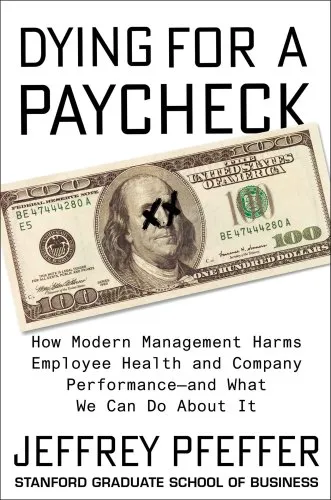Dying for a paycheck: how modern management harms employee health and company performance--and what we can do about it
4.5
Reviews from our users

You Can Ask your questions from this book's AI after Login
Each download or ask from book AI costs 2 points. To earn more free points, please visit the Points Guide Page and complete some valuable actions.Related Refrences:
Welcome to a compelling exploration of the modern-day workplace, where the balance between company demands and employee wellbeing is disturbingly skewed. In "Dying for a Paycheck: How Modern Management Harms Employee Health and Company Performance--and What We Can Do About It," renowned organizational behavior expert Jeffrey Pfeffer takes you on a gripping journey that delves deep into the often overlooked issue of workplace stress and its severe consequences. This book not only poses crucial questions about the sustainability of current corporate practices but also provides actionable insights for creating healthier work environments.
Detailed Summary of the Book
The modern workplace has evolved into an environment fraught with tension and stress, often leading to serious health implications for employees, both mentally and physically. Jeffrey Pfeffer's "Dying for a Paycheck" meticulously examines the toxic culture prevalent in many organizations today. Drawing on a wealth of real-world examples, thorough research, and compelling statistical data, Pfeffer argues that the traditional management system is flawed and unsustainable. With rigorous scrutiny, he presents case studies from a variety of industries and elucidates how these unhealthy work environments translate into poor organizational performance, manifesting through absenteeism, turnover, and decreased productivity. The book intricately details how the human and economic costs associated with stress are alarmingly high, thus questioning the very premise of current management practices.
Key Takeaways
- Workplace stress is a pervasive yet underestimated issue that transcends industries and geographies, impacting employee health and organizational efficiency.
- Companies perpetuate stress through practices like long working hours, job insecurity, lack of work-life balance, and absence of workplace autonomy.
- The financial implications of poor employee health due to stress are profound, with direct costs in the form of healthcare and indirect costs through reduced productivity.
- Pfeffer emphasizes the importance of re-evaluating management styles and advocates for systemic changes that prioritize employee wellbeing alongside organizational goals.
- Strategies such as flexible working arrangements, employee empowerment, and fostering a supportive organizational culture are vital for reversing the negative trends in workplaces today.
Famous Quotes from the Book
"The biggest thing you can do is to stop treating people as disposable objects and instead see them as sources of sustainable productivity."
"If you want to truly be customer focused, start with your employees, because happy employees lead to happy customers."
Why This Book Matters
"Dying for a Paycheck" is not merely a critique of current management practices; it is a catalyst for change. At a time when mental health in the workplace is gaining much-needed attention, this book serves as a crucial resource for leaders, human resources professionals, and policymakers who have the power to instigate meaningful change. Pfeffer’s research-backed arguments compel us to move beyond the profit-centric view of business to one that harmonizes organizational success with employee welfare. His insights offer a blueprint for sustainable business practices, emphasizing the idea that when employees thrive, companies thrive. By providing tangible solutions, this book is a vital read for anyone seeking to enhance workplace environments, ensuring they are conducive to both individual happiness and corporate prosperity.
In conclusion, "Dying for a Paycheck" urges us to re-examine workplace norms that have long been accepted without sufficient scrutiny. Pfeffer provides a strong foundation for advocating change, not just for the sake of employees, but for the long-term success and health of the organizations themselves. It's a clarion call for a movement that has the potential to revolutionize the way we think about work and the people who carry it out.
Free Direct Download
You Can Download this book after Login
Accessing books through legal platforms and public libraries not only supports the rights of authors and publishers but also contributes to the sustainability of reading culture. Before downloading, please take a moment to consider these options.
Find this book on other platforms:
WorldCat helps you find books in libraries worldwide.
See ratings, reviews, and discussions on Goodreads.
Find and buy rare or used books on AbeBooks.



